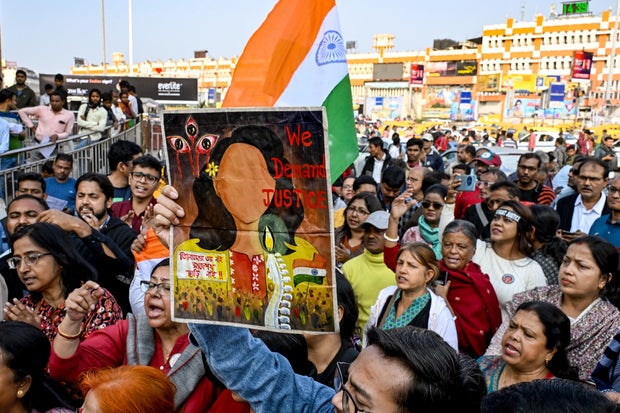A police volunteer was found guilty of the rape and murder of a trainee doctor in India, a crime that sparked countrywide protests and hospital strikes last year.
Judge Anirban Das said the sentence for 33-year-old Sanjay Roy will be announced on Monday and could range from life imprisonment to the death penalty.
Protests erupted in West Bengal last August to demand justice after the body of a 31-year-old trainee doctor was found with multiple injuries in a lecture hall in Kolkata’s state-run R.G. Kar Medical College and Hospital. Authorities at the time said the woman had gone to the lecture hall to rest during a night shift when she was attacked.
Samir Jana/Hindustan Times via Getty Images
An autopsy later found the victim had been raped and assaulted before she died. It also suggested she resisted and may have been tortured before being murdered.
Roy was arrested a day after the crime but was not officially charged until nearly two months later. He has since consistently maintained his innocence and told the court that he was not guilty.
The trial in the case was fast-tracked through India’s notoriously sluggish legal system and arguments began in November. It also highlighted once again the chronic issue of violence against women in the country.
After the incident, doctors and medical students across India held protests and rallies demanding justice and better security for them. Thousands of women across the country also protested on the streets, demanding justice for the victim as they participated in “Reclaim The Night” marches. Some protesters called for the perpetrator of the crime to be given the death penalty.
DIBYANGSHU SARKAR/AFP via Getty Images
The incident highlighted rising sexual violence against women in India and prompted India’s Supreme Court to set up a national task force that suggested ways to enhance safety measures in government hospitals.
Many cases of crimes against women go unreported in India due to the stigma surrounding sexual violence, as well as a lack of faith in the police. Women’s rights activists say the problem is particularly acute in rural areas, where the community sometimes shames victims of sexual assault and families worry about their social standing.
Still, the number of recorded rape cases in the country has increased. In 2022, police recorded 31,516 reports of rape — a 20% jump from 2021, according to the National Crime Records Bureau.
In 2012, the gang rape and killing of a 23-year-old student on a New Delhi bus galvanized massive protests across India. It inspired lawmakers to order harsher penalties for such crimes, as well as the creation of fast-track courts dedicated to rape cases. The government also introduced the death penalty for repeat offenders.
The rape law amended in 2013 also criminalized stalking and voyeurism and lowered the age at which a person can be tried as an adult from 18 to 16.
www.cbsnews.com



